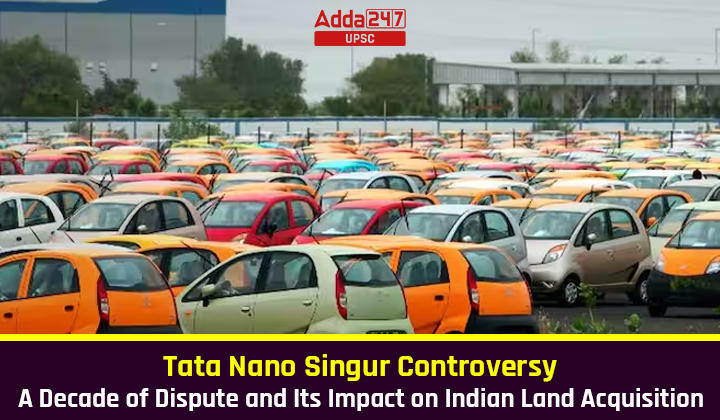Table of Contents
In a recent development, an arbitration tribunal has awarded Tata Motors Ltd a compensation of ₹766 crore for its capital investment losses in the Singur manufacturing plant, which was stalled over a decade ago. This compensation is to be recovered from the West Bengal government.
The long-standing Tata Nano Singur controversy, which dates back to 2006, has resurfaced with this decision, bringing to light the complex issues surrounding government policies, land acquisition, and the industrial landscape in India. In this article, we will delve into the details of the controversy, the reasons behind Tata’s initial choice to establish a factory in Singur, the subsequent relocation to Sanand in Gujarat, the recent arbitration tribunal’s verdict, and the stance of the Supreme Court on the matter.
Tata Nano Singur Controversy
- The Tata Nano Singur controversy originated in 2006 when the Left Front government in West Bengal announced that Tata Motors would establish a car manufacturing unit in Singur to produce the much-anticipated Tata Nano, famously referred to as the “world’s cheapest car” with a price tag of ₹1 lakh (100,000 rupees). The government allocated approximately 1,000 acres of farmland in Singur to Tata Motors for this purpose.
- However, what followed in the years to come was a maelstrom of protests, opposition, and public discourse that ultimately led to the abandonment of the Singur project by Tata Motors.
- The decision to set up the factory in Singur and the subsequent move to Sanand in Gujarat raised several crucial questions that continue to echo in the realm of Indian industrial development.
Reasons for Tata’s Initial Choice of Singur and Subsequent Relocation
- The decision to establish the Tata Nano factory in Singur was primarily driven by factors such as proximity to suppliers, cost-effectiveness, and the availability of land.
- Tata Motors believed that Singur’s location would enable efficient production, reducing transportation costs and increasing economies of scale. The company invested more than ₹1,000 crore in the project before its abandonment.
However, this decision faced significant opposition from various quarters. The Trinamool Congress (TMC), which is currently in power in West Bengal, played a pivotal role in organizing protests against land acquisition for the project.
Farmers and locals raised concerns about land displacement, livelihoods, and environmental impact. This grassroots resistance snowballed into a major political movement, eventually compelling Tata Motors to reconsider its decision.
Why did the Tata Nano fail in Singur?
Several factors contributed to the failure of the Tata Nano project in Singur:
- Land Acquisition and Protests: The controversial land acquisition process and the protests against it created a hostile environment for the project. Farmers and activists argued that agricultural land was being taken away for industrial purposes, which would adversely affect their livelihoods.
- Political Opposition: The TMC, led by Mamata Banerjee, vehemently opposed the project and mobilized public sentiment against Tata Motors. The political landscape played a significant role in derailing the project.
- Delay and Uncertainty: The Singur project faced significant delays and uncertainty due to these factors, which, in turn, affected Tata Motors’ production schedule and the company’s reputation.
- Relocation to Sanand: Given the mounting challenges and the inability to proceed with the Singur plant, Tata Motors decided to relocate the Nano project to Sanand in Gujarat, where it eventually found success.
The Recent Arbitration Tribunal’s Verdict
- In the latest twist of this long-standing saga, an arbitration tribunal has ruled that Tata Motors is entitled to recover ₹766.78 crore in compensation from the West Bengal Industrial Development Corporation Ltd (WBIDC) for its losses in the Singur project.
- The tribunal also ordered that the compensation accrue interest at 11 percent per annum from September 1, 2016, until actual recovery.
- The tribunal’s unanimous decision, which was made on October 30, has significant financial implications for the West Bengal government.
- Tata Motors has also been allowed to recover an additional ₹1 crore for the cost of the arbitration proceedings from WBIDC. This verdict raises important questions about the responsibilities of government agencies in land acquisition and industrial development projects.
Supreme Court’s Stance on the Tata-Singur Controversy
- The Tata Nano Singur controversy has had a protracted legal journey, with the matter eventually reaching the Supreme Court of India. The Supreme Court, in 2016, declared the Singur Land Rehabilitation and Development Act, 2011 as unconstitutional.
- The West Bengal government passed this Act to reclaim land from Tata Motors and return it to the farmers.
- The Supreme Court’s decision essentially nullified the government’s attempt to take back the land allocated to Tata Motors.
- It was a crucial legal judgment that upheld the rights of the company to retain the land, and this has now culminated in the recent arbitration tribunal’s decision to award compensation to Tata Motors.
Conclusion
The Tata Nano Singur controversy is a poignant case study of the complexities and challenges faced by industrial development in India. It underscores the importance of responsible land acquisition and the need for a balance between economic development and the welfare of local communities.
The recent arbitration tribunal’s award of ₹766 crore in compensation to Tata Motors raises questions about the accountability of government agencies in such projects. It is a reminder that long-pending disputes can resurface with significant financial implications. The Singur saga is a testament to the intricate interplay of politics, economics, and societal impact in the world’s largest democracy.



 TSPSC Group 1 Question Paper 2024, Downl...
TSPSC Group 1 Question Paper 2024, Downl...
 TSPSC Group 1 Answer key 2024 Out, Downl...
TSPSC Group 1 Answer key 2024 Out, Downl...
 UPSC Prelims 2024 Question Paper, Downlo...
UPSC Prelims 2024 Question Paper, Downlo...
